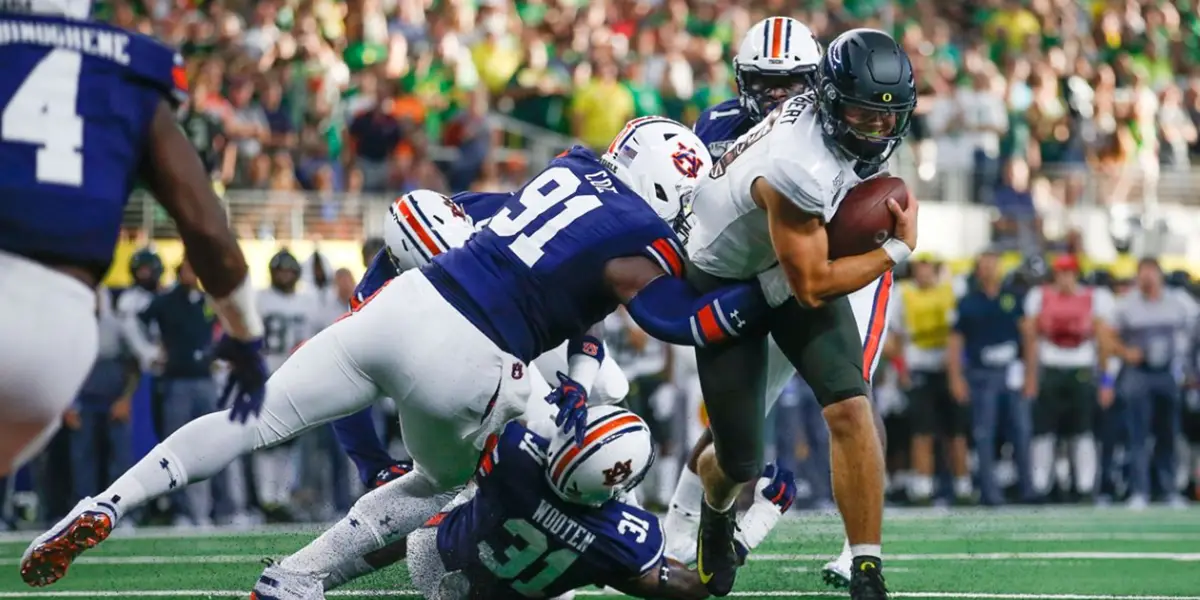A curious trend has emerged in college football — one that’s as senseless as it is perplexing. Fans and analysts alike have become fixated on conference strength.
It used to be blasphemous, but nowadays, many Oregon fans find themselves cheering on their fieriest rivals in out-of-conference or bowl games, hoping that they represent the Pac-12 well and improve its perception. Even head coach Mario Cristobal seems to care a great deal about the image of the Pac-12, championing the success of its teams and speaking about the importance of representing the conference in a recent Pac-12 coaches webinar.
But all of this conference propaganda is hogwash.
Of course, a conference’s collective performance has monetary implications. But as it relates to a particular football team’s College Football Playoff chances, the success, or lack thereof, of its conference is largely irrelevant. A team like Oregon shouldn’t give a lick about the state of the Pac-12. Whether the conference is loaded with top-25 teams or the Ducks are its only contender, the path to the playoff has been clearly defined, and conference strength isn’t much of a factor.
Strength of Schedule Is Overrated
The growing emphasis on conference superiority is based on the supposed importance of a team’s strength of schedule. Theoretically, if a conference is full of good teams, then the team that wins that conference would have had to navigate a very difficult schedule, and in turn, would have a very convincing argument to make the playoff and rank highly in it. Conversely, if a team wins a weak conference, it would have had a far easier road, and would have a far less convincing argument to make the playoff or rank highly in it in the playoff committee’s eyes.

Oregon played Auburn to strengthen its schedule in 2019.
This is the reason the Ducks have gone out of their way to schedule challenging out-of-conference games, including last season’s game against Auburn and an upcoming home-and-home series with Ohio State. The hope is that if Oregon is able to win difficult non-conference games, then it will likely receive a boost in the committee’s eye, despite a weak Pac-12 slate.
History has shown that a team doesn’t even have to win all of its games, or even its conference, as long as it performs well enough against a difficult schedule. Ohio State and Alabama, in 2016 and 2017, respectively, didn’t even win their divisions, and yet, both teams made the playoff, largely because both teams had a difficult road and managed only a loss apiece.
But these widely held beliefs about the importance of strength of schedule are flawed. Although it would be inaccurate to state that strength of schedule is completely irrelevant, as the playoff committee clearly values it to a degree, there’s a clear criteria for making the college football playoff, and the overriding, number-one factor is simply being, at worst, a one-loss Power 5 conference champion.

Oklahoma made the playoff in 2019 despite an underwhelming conference slate.
In the six-year history of the college football playoff, there has only been one year in which a one-loss Power 5 conference champion didn’t make the cut. In 2014, the committee had the difficult job of deciding between co-Big 12 champions TCU and Baylor or B1G champion Ohio State — all one-loss teams. The Buckeyes were the selection, following a shellacking of Wisconsin in the B1G championship game, and it was the first and only time that the committee has had to make such a decision. Outside of that anomalous season, however, every single one-loss or undefeated Power 5 conference champion has made the playoff, regardless of conference strength.
Even the one-loss Alabama and Ohio State teams that made the playoff without winning their conferences only made the cut because there were no other one-loss Power 5 conference champions that they had to compete against for a spot. Strength of schedule is important if all things are equal among Power 5 conference champions, but very rarely are there five one-loss or undefeated champions to choose from.
Wins, regardless of how they’re earned, have been the data point that the committee point prioritizes above the rest (crazily enough). Sure, a team’s strength of schedule does impact its seeding, but if the goal is to simply make the playoff, it doesn’t matter whether a team plays 10 top-25 opponents or none. As long as it wins 12 or 13 games, that team is likely going to the playoff.
What This Means for Oregon
The Ducks don’t need to “Back the Pac” and attempt to improve the conference’s image in order to gain clout in the eyes of the playoff committee. As long as the Ducks handle their Pac-12 opponents, they’ll be in the playoff more often than not.

Breathe easy, Oregon fans. You can comfortably root against your rivals.
If the usual contenders like USC and Washington return to prominence, fine. Oregon can point to those high-profile matchups as a reason to be ranked higher in the final playoff poll, considering it actually wins those games. But playing tough opponents means nothing if those opponents end up winning. No matter how dominant a team’s conference, a two-loss team is hard pressed to make the playoff, and any more losses than that completely eliminates a team from the playoff discussion.
It’s a risky proposition scheduling difficult opponents and playing in a conference with multiple championship contenders. Georgia and Penn State, for example, have been two of the most successful teams over the past four years, but the two have a single playoff appearance between them because of the strength of their conferences. Sometimes, it’s more of a curse than a blessing to play top-flight opponents week in and week out.
So, Oregon fans, be careful what you wish for. An improved Pac-12 might hurt the Ducks’ playoff chances more than it helps them.
Joshua Whitted
Morgantown, West VirginiaTop Photo by Kevin Cline
Joshua is an adopted Duck fanatic, originally hailing from southwestern Pennsylvania. His love for the University of Oregon began as a young child when he became mesmerized by the flashy uniforms and explosive offenses of the Chip Kelly era, and now, he follows the team religiously. His fondest memory of the team is seeing De’Anthony Thomas race past Wisconsin defenders back in the 2012 Rose Bowl. A true football enthusiast, Joshua loves studying the intricacies of the game, and he aspires to become a professional sports journalist. Joshua now resides in Morgantown, West Virginia where he works in customer service. When he’s not watching Oregon replays, Joshua loves reading, writing, and spending time with his family. Contact: whittedjd@gmail.com


